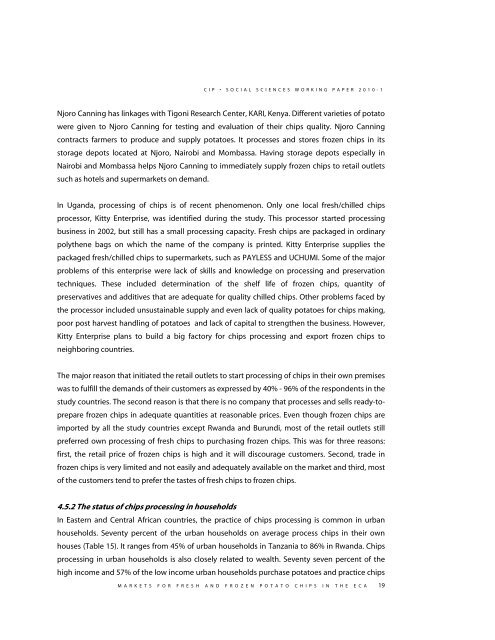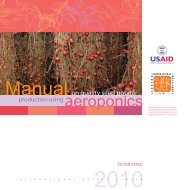Download pdf - International Potato Center
Download pdf - International Potato Center
Download pdf - International Potato Center
Create successful ePaper yourself
Turn your PDF publications into a flip-book with our unique Google optimized e-Paper software.
CIP • SOCIAL SCIENCES WORKING PAPER 2010-1<br />
Njoro Canning has linkages with Tigoni Research <strong>Center</strong>, KARI, Kenya. Different varieties of potato<br />
were given to Njoro Canning for testing and evaluation of their chips quality. Njoro Canning<br />
contracts farmers to produce and supply potatoes. It processes and stores frozen chips in its<br />
storage depots located at Njoro, Nairobi and Mombassa. Having storage depots especially in<br />
Nairobi and Mombassa helps Njoro Canning to immediately supply frozen chips to retail outlets<br />
such as hotels and supermarkets on demand.<br />
In Uganda, processing of chips is of recent phenomenon. Only one local fresh/chilled chips<br />
processor, Kitty Enterprise, was identified during the study. This processor started processing<br />
business in 2002, but still has a small processing capacity. Fresh chips are packaged in ordinary<br />
polythene bags on which the name of the company is printed. Kitty Enterprise supplies the<br />
packaged fresh/chilled chips to supermarkets, such as PAYLESS and UCHUMI. Some of the major<br />
problems of this enterprise were lack of skills and knowledge on processing and preservation<br />
techniques. These included determination of the shelf life of frozen chips, quantity of<br />
preservatives and additives that are adequate for quality chilled chips. Other problems faced by<br />
the processor included unsustainable supply and even lack of quality potatoes for chips making,<br />
poor post harvest handling of potatoes and lack of capital to strengthen the business. However,<br />
Kitty Enterprise plans to build a big factory for chips processing and export frozen chips to<br />
neighboring countries.<br />
The major reason that initiated the retail outlets to start processing of chips in their own premises<br />
was to fulfill the demands of their customers as expressed by 40% - 96% of the respondents in the<br />
study countries. The second reason is that there is no company that processes and sells ready-toprepare<br />
frozen chips in adequate quantities at reasonable prices. Even though frozen chips are<br />
imported by all the study countries except Rwanda and Burundi, most of the retail outlets still<br />
preferred own processing of fresh chips to purchasing frozen chips. This was for three reasons:<br />
first, the retail price of frozen chips is high and it will discourage customers. Second, trade in<br />
frozen chips is very limited and not easily and adequately available on the market and third, most<br />
of the customers tend to prefer the tastes of fresh chips to frozen chips.<br />
4.5.2 The status of chips processing in households<br />
In Eastern and Central African countries, the practice of chips processing is common in urban<br />
households. Seventy percent of the urban households on average process chips in their own<br />
houses (Table 15). It ranges from 45% of urban households in Tanzania to 86% in Rwanda. Chips<br />
processing in urban households is also closely related to wealth. Seventy seven percent of the<br />
high income and 57% of the low income urban households purchase potatoes and practice chips<br />
M A R K E T S F O R F R E S H A N D F R O Z E N P O T A T O C H I P S I N T H E E C A 19
















